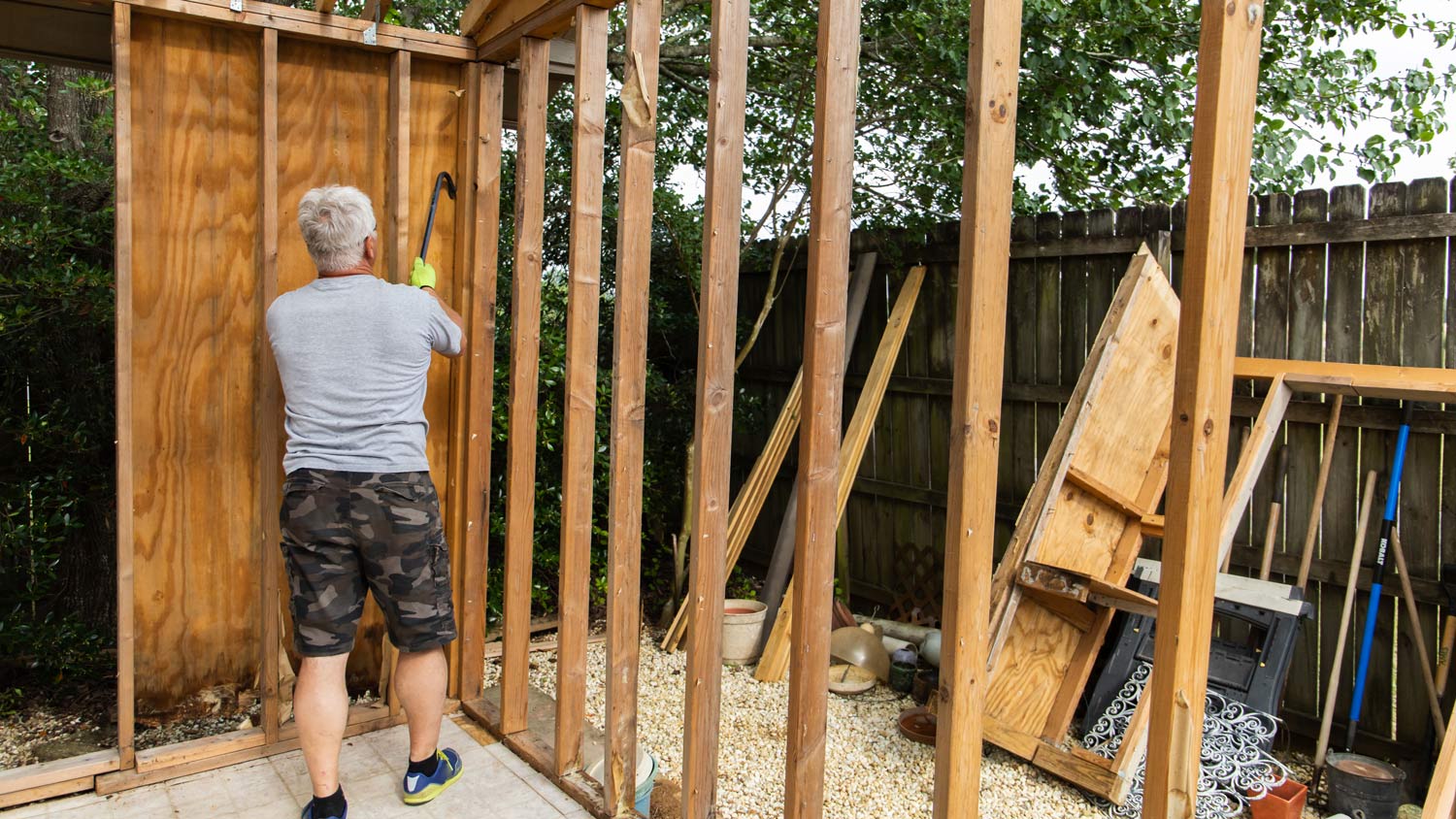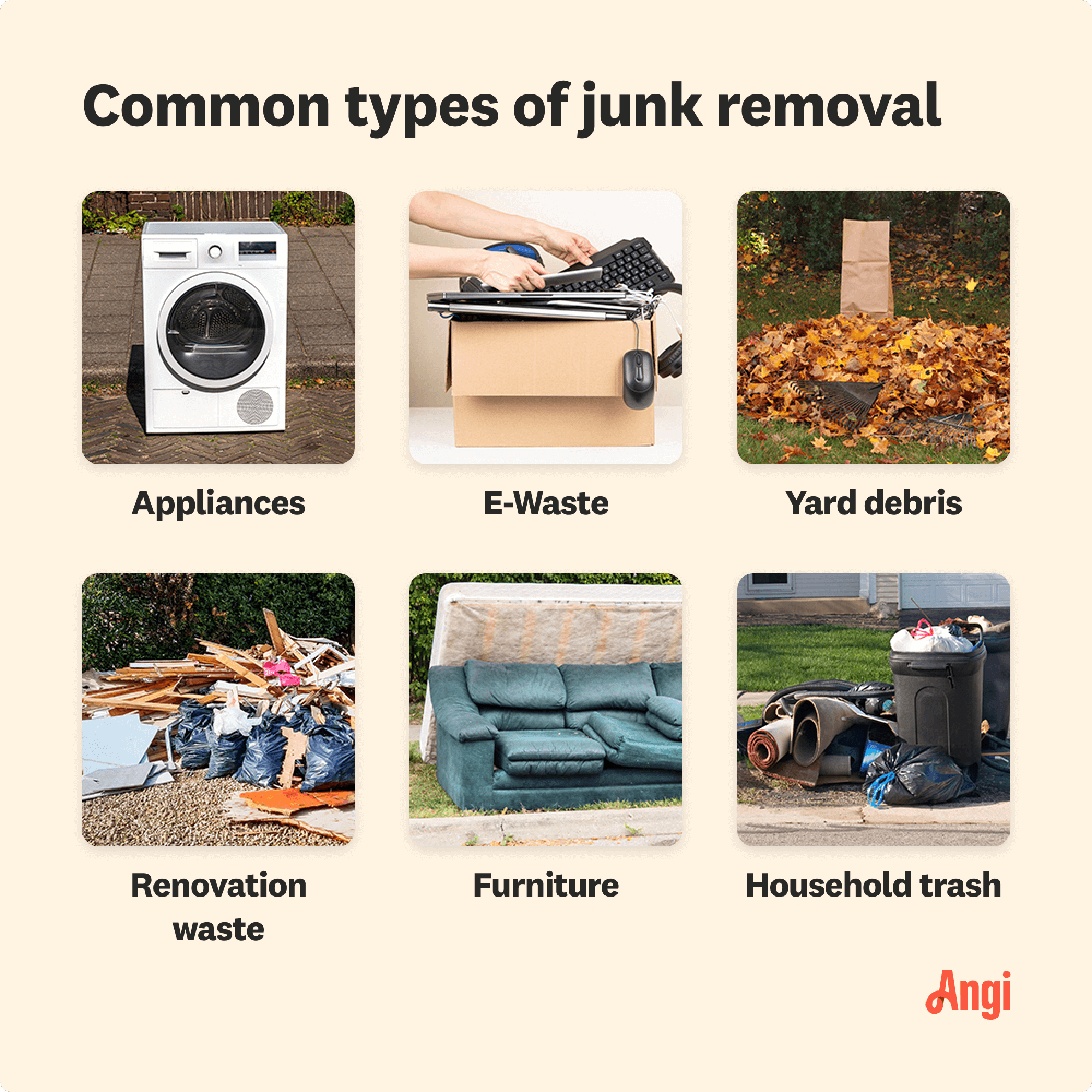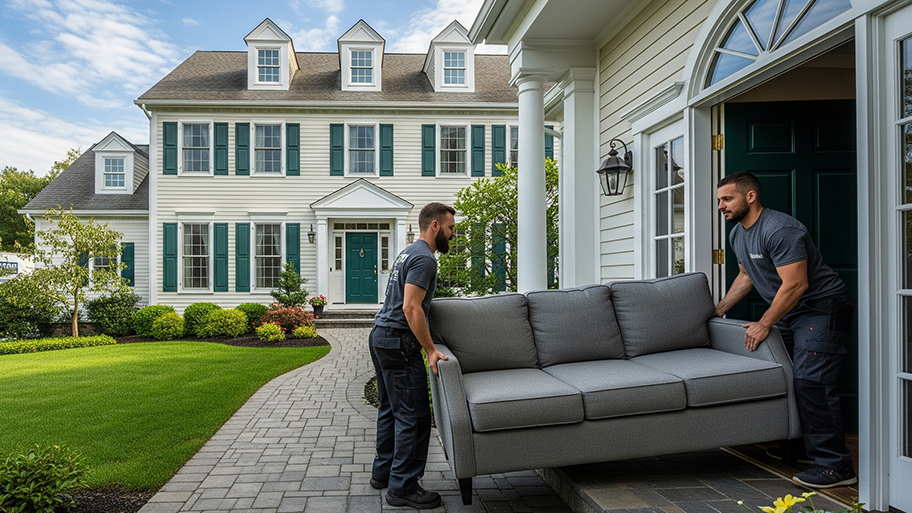
Removing a hot tub costs an average of $400. Learn what factors affect hot tub removal costs, including size, type of hot tub, and disposal method.
Removing a shed costs an average of $650, but costs range between $250 and $3,000 depending on size, foundation, and its condition.


The average cost to remove a shed is approximately $650, but it can range from $250 to $3,000, depending on its condition, size, and the type of foundation.
Most shed removals cost between $3.50 to $11.50 per square foot.
The average rate to pay a professional to remove a shed is between $50 and $100 per hour.
If your shed is located in a difficult-to-access area, it can significantly increase the price.
When your backyard shed has seen better days, and it’s time to upgrade or re-landscape, the first thing you need to do is tear down and clear out the old one safely. The average shed removal costs $650. However, you could spend $170 demolishing and clearing a small wooden tool shed yourself or over $3,300 to have the pros get rid of a large metal storage construction with a concrete foundation. You’ll need to factor in size, material type, accessibility, and more when budgeting for breakdown and removal.
Shed removal costs vary considerably depending on multiple factors. Consider the following when working out if the quotes you receive seem fair.

Shed removal costs vary considerably depending on multiple factors. Consider the following when working out if the quotes you receive seem fair.
Shed removal costs range from around $3.50 to $11.50 per square foot, and it shouldn’t come as a surprise that the bigger the shed, the more the removal will cost. Small sheds won’t require much labor, special equipment, or large disposal trucks.
It’s worth noting, however, that many companies have a minimum flat-rate fee, often starting around $250 or more. So, if your shed is very small, it might cost more than the lower per-square-foot price point. Here’s what you can expect to pay for some common shed sizes.
| Common Shed Size | Average Price Range |
|---|---|
| 8’ x 6’ | $170–$550 |
| 10’ x 12’ | $420–$1,380 |
| 10’ x 16’ | $560–$1,840 |
| 12’ x 24’ | $1,000–$3,300 |
Sheds are typically made from wood, metal, or vinyl. Metal sheds might cost more to remove because shifting large metal sheets often requires additional labor, and disposal fees can be higher for heavier materials. If you plan to salvage and recycle materials from a wooden garage, this could also increase the price because more care and time in dismantling is required. Simple prefab sheds vs. complex custom builds will likely be easier and quicker to bring down.
If your shed sits at the bottom of a long, narrow yard where vehicle access is tricky, the removal company may charge more. They must factor in the extra time and effort to haul the dismantled sections through the yard to reach the dumpster truck.
While most contractors charge by square foot, others charge hourly for their time. This typically works out between $50 to $100 per hour.
While you certainly don’t have to tip your junk haulers, it can be a nice gesture if you feel they’ve done an exceptional job. Consider tipping each worker $20 if you’re very pleased with the work, but don’t feel obligated to—after all, you’ve already paid for the service.
If your building has been sitting on a concrete foundation that you want to be broken down and taken away, expect shed removal costs to be considerably higher. Removing this heavy material requires more time and tools, and the extra weight in the dumpster can also factor into the price. Concrete removal costs around $2 to $6 per square foot.
It might seem counterintuitive, but if you want to be rid of a large old shed with a sagging roof or rotting wooden framework, don’t be surprised if the pros need to charge more. There is an increased risk of injury from structural collapse, and more care is required when pulling it down. The same might apply to rusty metal sheds with sharp, exposed edges.
Don’t land yourself with a bigger bill by breaking the rules. Always check with your local building department what the regulations are for shed removal. While they vary by state, you often need a permit to remove a shed—especially when it is a more significant structure. The cost for a building permit of this type ranges from $100 to $500, but it could be more for a big shed hooked up to utilities and with a concrete foundation.
For sheds wired for electricity or with plumbing, these utilities require safe disconnection before dismantling can begin. You might need to hire an electrician near you or a plumber to ensure this is handled appropriately. The cost to hire an electrician or a plumber is typically between $50 and $100 per hour.
There’s a possibility your old shed could contain hazardous asbestos—especially if it has been there since before 1970 and the side paneling or roof has cement components. If there is any doubt, an inspection should take place. Professional asbestos removal costs for outdoor projects typically range from $50 to $150 per square foot.
After the shed is gone, you’ll likely be left with an unsightly muddy patch. You might want to hire a landscaper to clean up the space and replant. Professional landscaping costs an average of $4.50 and $12 per square foot.
If your large shed is full of old junk and you want that gone, too, make sure you factor this into your final budget. Often, the same company will move shed contents—providing the items aren’t hazardous—but they might need a bigger dumpster, which will take extra time to clear out.
Fees to dispose of your shed will depend on its size and how much debris you need to haul away. In most cases, they range from $300 to $1,800. Note that some contractors will include these costs in their project quote while others may charge for this service separately.
Your geographic location will play a role in how much it costs to remove a shed. It’s a good idea to call local contractors in your area to get an idea of average junk removal prices so you can ensure you get a good deal and avoid overpaying. Here are a few cost figures for shed removal in various parts of the U.S.
| State | Cost per Load |
|---|---|
| Michigan | $150–$350 |
| Texas | $133–$372 |
| California | $660–$1010 |
| Illinois | $342.90–$527.54 |
If you’ve got the tools and the time, you can save by removing a shed yourself. However, you’ll likely still have to pay for junk removal or rent a dumpster. Junk removal costs an average of $240, and dumpster rental costs an average of $380 per week, but you might be able to get a daily dumpster rate.
If you have a large van and your shed is small, you could even take the pieces to a local recycling center or landfill, meaning the job only costs you your time.
Just like shed building, removal of these constructions isn’t always a DIY job. You need the right tools, assistance, and know-how, especially for big sheds. Saving a few bucks isn’t worth running the risk of causing injury. And without sufficient construction knowledge, there’s a chance of a saggy roof or heavy metal walls collapsing in on you. Plus, it's a physically demanding project that isn’t easy to tackle single-handedly.
Unless your shed is a small, basic construction or you are an old hand at these sorts of projects, calling in a professional junk removal service near you is a prudent investment.
If you decide to remove your shed, you may require additional services. In most cases, you’ll need to pay extra for them, so it’s important to factor the cost of these into your budget. You should also discuss their cost with your contractor or junk removal company or you may face hidden fees and unwanted financial surprises. Some of the most common add-on costs you might face include:
Site cleanup cost ($100 - $1,100): There’s a good chance your shed removal project will leave a mess. Depending on your situation, you may want to invest in yard cleanup services. The size of your yard and the amount of waste you have will determine what you’ll pay.
Grading cost ($1,023 - $3,338): After removing your shed, you might require grading or leveling to ensure proper damage, reduce the risk of soil erosion, and protect your home. Since grading is an extensive undertaking, it may run you a couple thousand dollars, especially if you have a larger yard.
Landscaping cost ($1,249 - $6,071): You might decide to give your yard a makeover after a shed gets removed. As a result, you may dish out some extra cash for landscaping. Of course, you’ll pay to completely revamp your outdoor space than to simply add a few plants.

There are other ways to shave your shed removal costs other than trying to DIY the project. Below are some money-saving tips worth considering:
Shop around. It pays to get quotes from multiple reputable junk removal companies offering shed dismantling services. Prices can vary considerably.
Sell your shed. If it is in good condition, you can make some money and have the buyer dismantle and remove it.
Salvage. Sell reclaimed lumber and metal to timber merchants or scrap metal yards. Hold on to parts of the shed that these companies might collect and pay for.
Bulky uplift. Local authorities often offer an annual free bulky uplift service. If you time your shed disposal with this service (and the materials fit within their remit), you will only have to pay for dismantling and not disposal.
Bulk discount. By arranging other yard waste removal or getting rid of other bulky items simultaneously, you could make savings across the board.
Home is the most important place on earth, which is why Angi has helped more than 150 million homeowners transform their houses into homes they adore. To help homeowners with their next project, Angi provides readers with the most accurate cost data and upholds strict editorial standards. We extensively research project costs to develop the pricing data you see, so you can make the best decisions for you and your home. We rely on reputable sources, including the U.S. Bureau of Labor Statistics, academic journals, market studies, and interviews with industry experts—all to ensure our prices reflect real-world projects.
Want to help us improve our cost data? Send us a recent project quote to [email protected]. Quotes and personal information will not be shared publicly.
From average costs to expert advice, get all the answers you need to get your job done.

Removing a hot tub costs an average of $400. Learn what factors affect hot tub removal costs, including size, type of hot tub, and disposal method.

Junk removal costs depend on the volume and type of waste you need removed, but paying a professional saves you time and energy over hauling it yourself.

Furniture removal costs depend on the type, size, and location of items. Learn the average cost of furniture removal to free up room in your home.

Box springs are big, cumbersome, and downright annoying to get rid of. Here are the best ways to dispose of a box spring without too much frustration.

Junk removal services will haul away your clutter and save you multiple trips to the dump. Learn how to prepare for junk removal to make the process easier.

Getting rid of your old stuff? Learn how to dispose of a couch through a variety of methods, from junk hauling to donating.